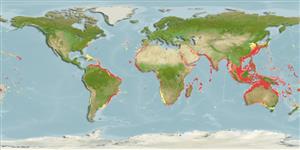Common names from other countries
>
Aulopiformes (Grinners) >
Synodontidae (Lizardfishes) > Synodontinae
Etymology: Trachinocephalus: Greek, trachys, -eia, -ys = rough + Greek, kephale = head (Ref. 45335).
More on author: Forster.
Environment: milieu / climate zone / depth range / distribution range
Ekologi
marina revassocierade; djupintervall 0 - 400 m (Ref. 110386), usually 3 - 90 m (Ref. 4472). Tropical; 40°N - 40°S, 76°W - 154°W
Atlantic Ocean: Western Atlantic Ocean from Cape Cod, Massachusetts to Brazil, including Bermuda, Bahamas, Antilles and Gulf of Mexico). Eastern Atlantic from Mauritania to Gabon, including Saint Helena and Ascension Islands.
Size / Vikt / Age
Maturity: Lm ? range ? - ? cm
Max length : 32.6 cm TL hane/ej könsbestämd; (Ref. 55642); rapporterad maxålder: 7 år (Ref. 36558)
This species is distinguished from its congeners by the following characters: snout length (LSn) 53.2-117.0% eye diameter (DE), mean 79.1% (vs. mean 40.1% in T. gauguini and 74.8% in T. trachinus); LSn 13.5-27.0% body depth (DB), mean 21.6 (vs. mean 14.7% in T. gauguini); interorbital width 3.4-11.9%, mean 8.9% LH (vs. mean 5.6% in T. gauguini); DE 10.8-21.7% LH, mean 15.7% (vs. mean 16·6% in T. trachinus); length
of the last dorsal-fin ray 7.3-11.6% LS, mean 9·4% (vs. mean 10.1% in T. trachinus and 10.8% in T. gauguini); anal-fin rays 13-16, mode 15 (vs. mode 14 in T. gauguini and 16 in T. trachinus); pectoral-fin rays 11-13, mode 12 (vs. mode 11 in T. gauguini); lateral-line scales 53-60, mode 57 (vs. mode 56 in T. gauguini); predorsal scales 15-20, mode 17 (vs. mode 16 in T. trachinus); further differs from T. gauguini and T. trachinus by deep mitochondrial distances (16.9-17.6 and 15.1-17.8%, respectively) (Ref. 110386).
Rest on or more often burrow into substrate, leaving eyes exposed (Ref. 4472).
Life cycle and mating behavior
Maturities | Reproduktion | Spawnings | Egg(s) | Fecundities | Larver
Polanco, F.A., P.A. Acero and R. Betancur-R, 2016. No longer a circumtropical species: revision of the lizardfishes in the Trachinocephalus myops species complex, with description of a new species from the Marquesas Islands. J. Fish Biol. 89(2):1302-1323. (Ref. 110386)
IUCN Red List Status (Ref. 130435)
CITES (Ref. 128078)
Not Evaluated
Threat to humans
Harmless
Human uses
Fiskeri: mindre kommeriell
Verktyg
Special reports
Download XML
Internet-källor
Estimates based on models
Preferred temperature (Ref.
115969): 18.9 - 29, mean 27.3 (based on 4584 cells).
Phylogenetic diversity index (Ref.
82804): PD
50 = 0.7500 [Uniqueness, from 0.5 = low to 2.0 = high].
Bayesian length-weight: a=0.00302 (0.00185 - 0.00492), b=3.37 (3.23 - 3.51), in cm Total Length, based on LWR estimates for this species & (Sub)family-body (Ref.
93245).
Trofisk nivå (Ref.
69278): 4.4 ±0.4 se; based on diet studies.
Resiliens (Ref.
120179): Mellan, lägsta populationsfördubblingstid 1,4-4,4 år (K=1.6; tm=2; tmax=7).
Fishing Vulnerability (Ref.
59153): Low vulnerability (23 of 100).
